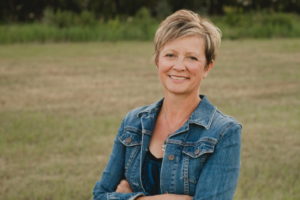A guest blog by Angela Lovell

When you are a couple running a busy farm alone, while also raising four young children, there isn’t a lot of time left over to pursue other passions or hobbies in your life, but over the years Anne Lazurko has always managed to squeeze in a few minutes every day to write.
It took many years, but keeping at it paid off when she published her first novel, Dollybird in 2013. She recently followed up with a new novel, What is Written on the Tongue (ECW Press), a story based loosely on her Dutch father’s experiences in occupied Holland during WWII and the subsequent Indonesian War of Independence.
Lazurko got a taste for news writing while editing the University of Saskatchewan’s student newspaper, the Sheaf, as she completed a political science degree. After graduating she spent two years as a reporter at a small-town newspaper in Edson, Alberta. Her degree, though, landed her a job with the Saskatchewan Wheat Pool as a district representative at Weyburn, working with delegates and local people on political issues.
On Wheat Pool business, Lazurko drove into the yard of her future husband, David, a dairy farmer at the time, and a few years later they were married and started a family, and her writing took a backseat as she took on a whole new life.
Writing takes a back seat
“I became a mom, and a dairy farmer, and the writing went to the side for awhile,” she says. “Life is strange. I didn’t know anything about dairy farms, and never would have dreamed that that would have been something I would do.”
But Lazurko threw herself wholeheartedly into learning the dairy business, although she still felt a tug to return to the writing career she had shelved.
“The dairy wasn’t my choice of career, it was David’s, but you do what you have got to do to make a living, so I learned how to do everything on the farm alongside raising four children,” she says.
After 15 years in the dairy business, the couple decided to sell the cows and for the past 18 years they have focused on grain farming their 2,000 acres, where they grow canola, lentils, spring and durum wheat. As the children got older, Lazurko also went back to writing.
“I didn’t go back to the journalism right away, I actually started doing some creative work,” she says. “I had some poetry published and I worked on short stories. I’ve been a member of the Saskatchewan Writers’ Guild for 30 years, so I took a lot of workshops, went to their events and got to know other writers in the community. I always felt maybe they were wondering what I was doing there because I wasn’t getting much published. I knew that didn’t stop me being a writer, but in my mind, I was just sort of hovering.”
Mentors and training
Although she continued to work on the farm, Lazurko decided it was time to get more serious about her parallel career. She found mentor Connie Gault (a fellow Saskatchewan novelist and playwright) through the SWG’s mentorship program. “She helped give me confidence in my writing, and I began to think maybe I could get more pieces published,” Lazurko says.
From that experience she began writing a short story, keeping at it until it became a novel. With a full draft of Dollybird in hand she took an eight-month creative writing course via correspondence through Humber College, which helped her take her writing to the next level.
She also got back into journalistic writing, beginning with community and business profiles for Saskatchewan Business Magazine, and evolving, logically, given her farming background, into writing for Grainews and Country Guide.
When Dollybird hit bookstore shelves, Lazurko was finally a published novelist, but, as much as she wanted to devote more time to her writing, there was no magical transformation that took place in the eyes of her farming family; she was still first and foremost a farmer and mom, and the farm didn’t take a backseat to her writing ambitions.
“After Dollybird came out, the family and my husband were happy, and proud but even at that point for the farm it was like the writing was the sideline,” she says. “I also fit the journalistic writing in-between the spaces wherever I could which wasn’t easy. And for a very long time, what I really wanted to do was to pursue both those things in a real, full way.”
Creating space for writing
Over her farming career and while raising her family, Lazurko tried hard to create space for her writing, sometimes successfully, sometimes not. Over time, as the children got older, and then left home, and the farm could afford to hire some help when needed, she made more and more space for her writing until she was finally able to say, ‘I want and can write full-time.’
“I had been renting a little place in town for $100 a month that was freezing cold in the winter and blazing hot in the summer, but it was my little space, for working alone,” she says. “Then, we had all this space at home, so we converted one of the bedrooms upstairs into my office. I think it’s true for many women trying to create their own thing on the farm, to have either a different career or a parallel career, that they have to prioritize it. Often with men and farming, the farm comes first no matter what. And in my mind, I started to think, no it doesn’t have to come first for me. And it doesn’t have to. You end up doing a lot of the kid raising, and especially with a dairy, all of your time is taken by the farm and things outside yourself. If that’s your choice that’s great, but at some point, I thought, it’s not really my choice and I need to do what I need to do. So, I did more and more writing, still in the spaces between farming work but then eventually, after Dollybird had come out, and I’d had some success with it, I really wanted to work on this new novel and I stepped back from the farm.”
Lazurko admits there were some heavy discussions around that idea. “The thing about farming with each other, is that when you get into that groove, you’re very good at it,” she says. “You anticipate what has to happen, you trust each other with how things are going to go in the field, with the bookkeeping or whatever it is. You are always available,” she laughs. “Which is not necessarily a good thing.”
Dedicating more of her time to her writing meant David had to make adjustments that were hard at first. “It was not because he took me for granted, but it required an adjustment in terms of his management style because it had been just him and I for the most part,” she says. “He hired seasonal help and made small adjustments like putting the attachments on the back of the seed cart to pull the half-ton out in the field instead of having me running back and forth to fill up. There wasn’t any resentment; it was just more like ahhhh, you know?”
Sticking to your guns
Lazurko believes that both women and men need to try and find space for themselves and the things important to them as they progress through their farming careers. “If there was something I’d encourage my younger self and others to do it would be to create space for things that are important to them outside the farm, and that’s true of both partners in the operation,” Lazurko says. “The farm is all-consuming but I’m not sure it’s healthy to let it be, and it’s important to find that outlet and make time and space for it without constantly justifying it. It’s important for all kinds of reasons related to your relationships but also your attitude toward the farm itself.”
After many years of juggling her two parallel careers, Lazurko is enjoying doing what she loves and is good at if the reviews and awards are anything to go by. Lazurko has won many awards and accolades for her journalistic writing, and Dollybird won the WILLA Award for Historical Fiction. What is Written on the Tongue has received glowing reviews, including from Lawrence Hill, writer of the bestselling Book of Negroes and The Illegal.
She’s glad that she persisted with writing, however hard it was at times, and her best advice for someone busy trying to farm and pursue a parallel career is to be organized, and even at times when the farm needs surpass all else, remind yourself that you will at some point have time for yourself.
“Some things take precedence. Cows have to be fed. The combine has to run late because rain is in the forecast. But I can take things a little more in stride with the writing now because I know I’ll get back to it,” she says. “There is always something that’s going to come up kid-wise or farm-wise I suspect, but I know I will get there eventually because somehow, I always have.”
With time at such a premium over the years, Lazurko believes it’s made her both a better time manager and writer.
“When I look back, I was efficient as a writer when I was pressed for time, because that time was so precious to my writing that I used it very well,” she says. “It did take me 10 years to write Dollybird, but I had four kids and was just fitting it in, and even taking courses as well. I don’t know how I did that. But I think there’s a certain efficiency of time, and even efficiency of language within the writing that comes from all of that.”
A version of this article originally appeared in Country Guide Magazine.
©2022, Angela Lovell.




